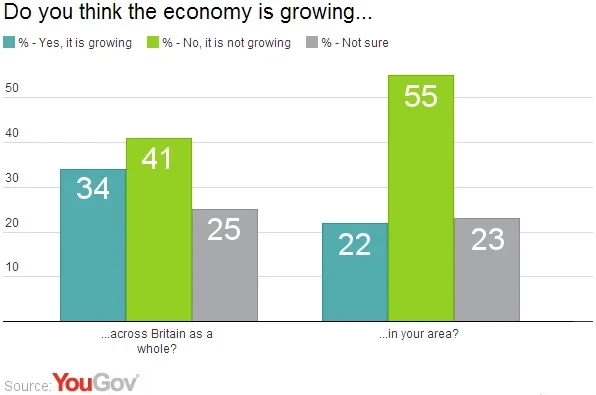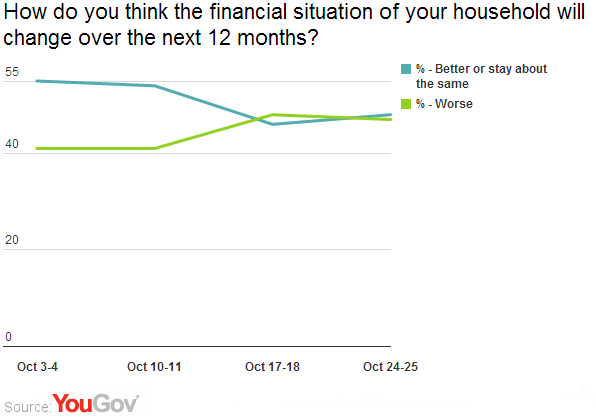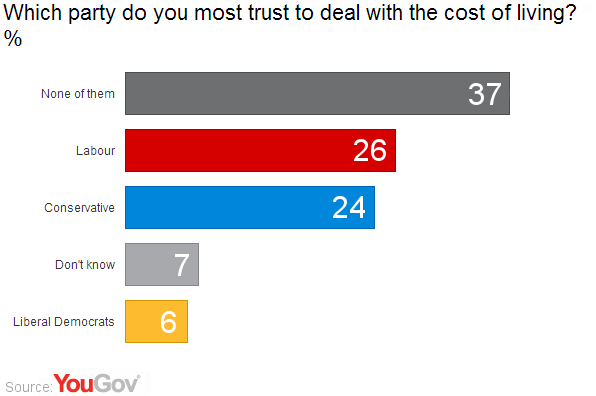YouGov President Peter Kellner: The Conservatives have reason to be confident, but growing GDP will not necessarily translate into rising support for the party
Accelerating growth, record numbers of people in work, consumer confidence and business optimism at their highest since 2009 – George Osborne’s new year hopes must surely have been exceeded by the figures that have been coming out in recent weeks. When the Office for National Statistics reported last Friday that the economy grew by 0.8% in the third quarter – equivalent to more than 3% a year – the news simply confirmed a story of steadily improving fortunes.
Want to receive Peter Kellner's commentaries by email? Subscribe here
YouGov data, compiled in partnership with the Centre for Economics and Business Research, helps to explain what is going on – and why growth looks set to continue. Among other factors, rising house prices have helped to dispel gloom among home-owners; and employees are also seeing improved order books and improving job prospects. (Access a fuller analysis of the latest YouGov/CEBR research.)
And yet, and yet… the latest YouGov survey for the Sunday Times suggests that the Chancellor’s economic sky is not completely cloudless:
- Most people are unconvinced that Britain’s economy is in fact growing at all; and only 22% say it is growing in their own area.

- This winter’s rise in energy prices seems to have knocked back the ‘feelgood factor’. 48% now expect that their household will be at least as well off 12 months from now as they are today, while 47% expect to be worse off. Four weeks ago optimists outnumbered pessimists by 55-41%.

- Although the Conservatives regularly outscore Labour when people are asked which party is best for Britain’s economy, Labour edges ahead of the Tories by 26-24% when people are asked which party they trust most ‘to deal with the cost of living’. (However, both parties lose out to ‘none of them’, which scores 37%. This suggests a mixture of scepticism and fatalism among millions of voters that no party has managed to dispel.)

These latest numbers should warn David Cameron and his Chancellor not to assume that growing GDP will necessarily translate into rising support for the Conservatives. Indeed, if people feel that economic growth is passing them by, and its fruits being seized by the undeserving rich (such as bankers and energy executives), then every time GDP growth figures make headlines could provoke at least as much resentment as optimism, especially if the Government has to endure a series of rows that create the impression that ministers are indifferent to hard-pressed families.
That said, the Conservatives have one big reason to be quietly confident. Paradoxically, it flows from the very fact that, despite the recovery in consumer confidence over the past few months, most people remain cautious both about their own prospects and the wider economy. Our figures, even before the most recent dip in optimism caused by the rows over energy prices, suggest that plenty of room remains for optimism to grow.
After all, if the Conservatives are only six points behind Labour when most people doubt whether economic growth has resumed, then the Tories should flourish if voters get the message that the worst is now behind us and the journey back to prosperity has truly begun.
All the Government needs to do is ensure that steady growth is maintained AND spreads to all parts of Britain AND feeds through to rising living standards; AND ministers must avert any more nasty shocks like the rise in energy prices AND persuade voters that the Conservatives are on the side of normal people, not just the rich AND safeguard the quality of the key public services such as schools and hospitals AND translate steady growth not only into more jobs but enough decently-paid full-time jobs AND make the Help to Buy scheme work for young couples trying to get on the housing ladder without inflating a house price bubble.
That’s all. Simple.
See the full YouGov / CEBR Consumer Confidence story
See the full YouGov / Sunday Times results
Want to receive Peter Kellner's commentaries by email? Subscribe here
Image: Getty






